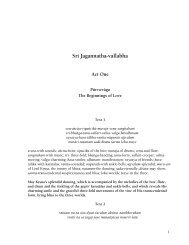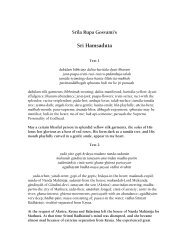Srimad Bhagavatam, Volume 3
Srimad Bhagavatam, Volume 3
Srimad Bhagavatam, Volume 3
Create successful ePaper yourself
Turn your PDF publications into a flip-book with our unique Google optimized e-Paper software.
<strong>Srimad</strong> Bhagawatam, First Canto, <strong>Volume</strong> Three<br />
unborn." In the Padmapurana it is said that those who are envious and always<br />
angry upon the Lord are unfit to know the actual and eternal form of the Lord.<br />
In the Bhagwatam also it is said that Lord appeared like the thunder bolt to<br />
those who were wrestlers. Sisupala also at the time of being killed by the Lord<br />
could not see Him as Krishna, being dazzled by the glare of the Brahmajyoti.<br />
Therefore, the temporary manifestation of the Lord as thunderbolt to the<br />
wrestlers appointed by Kansa or the glaring appearance of the Lord before<br />
Sisupala etc were relinqished by the Lord but the Lord as magican is eternally<br />
existent and is never vanquished at any circumstances. Such casual forms are<br />
temporarily shown to the Ashuras only and when such exhibitions are<br />
withbrawn the Ashuras only think that the Lord is no more existent as much<br />
as the foolish audience think of the magician as burnt into ashes or cut into<br />
pieces. The conclusion is that the Lord has no material body and therefore He<br />
is never to be killed or changed by His transcendental body.<br />
Yada mukundo bhagawan iman mahim<br />
Jahou satanwa sravaniasatkathah<br />
Tadahareva apratibuddhachetasam<br />
Abhadrahetuh kaliranwavartatah.<br />
Yada—when, Mukunda—Lord Krishna, Bhagawan—the Personality of<br />
Godhead, Imam—this, Mahim—earth, Jahou—left, Satanwa—with His selfsame<br />
body, Sravaniasatkahah—Hearing about Him is worthwhile, Tada—at<br />
that time, Ahareva—from the very day, Apratibuddhachetasam—of those<br />
whose mind is not sufficiently developed, Abhadrahetuh—cause of all<br />
inauspiciousness, Kaliranwavartatah—The Kali fully manifested.<br />
When the Personality of Godhead Lord Krishna left this earthly planet in<br />
His self-same form, from that date verily Kali who appeared slightly<br />
before, became fully manifested for creating inauspiousness for those who<br />
are endowed with poor fund of knowledge.<br />
The influence of Kali could be enforced only upon those who are not fully<br />
developed with Godconsciousness. One can neutralise the effects of Kali by<br />
keeping oneself fully under the Supreme Pare of the cersonality of Godhead.<br />
The age of Kali ensued just after the battle of Kurukshetra but it could not<br />
exert its influence on account of the presence of the Lord. The Lord however<br />
left this earthly planet in His own transcendental body and as soon as He left,<br />
the symptoms of the Kali Yuga as was visioned by Maharaj Yudhisthir prior<br />
to Arjun's arrival from Dwarka, began to manifest and Maharaj Yudhisthir<br />
rightly conjectured on departure of the Lord from earth. As we have already<br />
explained the Lord left, means He became out of our sight as much as sun sets<br />
means the sun is out of our sight.<br />
Yudhisthiras tat parisarpanam budhah<br />
Pure cha rastre cha grihe tatha atmani.<br />
Vibhavya lobha anrita jimbhra himsanadi<br />
Adharma chakram gamanaya paryadhat<br />
Yudhisthiras—Maharaj Yudhisthir, Tat—that, Pansarpanam—expansion,<br />
Budhah—thoroughly experienced, Pure—in the capital, Cha—as also,<br />
Rastre—in the State, Cha—and, Grihe—at home, Tatha—as also, Atmani—in<br />
person, Vibhavya—in creating, Lobha—avarice, Anrita—untruth, Jimbha—<br />
diplomacy, Hinsanadi—violence enviousness, Adharmam—irreligiosity,<br />
Chakram—a vicious circle, Gamanaya—for departure, Payadhat—dressed<br />
himself accordingly.<br />
Maharaj Yudhisthir was intelligent enough to understand about the<br />
influence of the age of Kali gradually expanding avarice, falsehood,<br />
cheating and violence all over the capital, state, home and individual<br />
person and wisely he prepared himself for starting from home and he<br />
dressed himself likewise.<br />
The present age is influenced by the specific qualities of the Kali and since the<br />
days of the battle of Kurkshetra about five thousands of years past the<br />
influence of the age of Kali began manifesting and from authentic scriptures it<br />
is learnt that the age of Kali is still to run on for 427000 four lacs and twenty<br />
seven thousands of years. The symptoms of the Kaliyuga as mentioned above<br />
namely avarice, falsehood, diplomacy, cheating, nepotism, violence and all<br />
such things ,are already in vogue and no body can think of what is going to<br />
happen gradually with further increase of the influence of Kali till the day of<br />
annihilation. We have already come to know that the influence of the age of<br />
Kali is meant for godless so called civilised man, otherwise those who are<br />
under the protection of the Lord has nothing to fear of the horrible age.<br />
Maharaj Yudhisthir was a great devotee of the Lord and there was no<br />
necessity of his being afraid of the age of Kali but he preferred to retire from<br />
active household life and prepare himself to go back to home back to<br />
Godhead. The Pandavas are eternal companion of the Lord and therefore they<br />
are more interested in the company of the Lord than anything else. Besides<br />
that, being an ideal king he wanted to retire just to set exanples for others that<br />
as soon as there is some young chap to look after the household affairs, one<br />
should at once retire from family life for uplifting oneself to spiritual<br />
realisation and no body should rot in the dark well of household life till one is<br />
dragged by the will of the Yamaraj. Modern politicians should take lessons<br />
from Maharaj Yudhisthir about voluntary retirement from active life making<br />
30<br />
room for the younger generation. So also retired old gentlemen also may take<br />
lesson from him and leave home for spiritual realisation before one is<br />
forcefully dragged away to meet death.<br />
Samrat poutram viniyatam atmanah susammam gunaih<br />
Toyanibyah patim bhumer abhyasinchad gajahvaye.<br />
Samrat—the emperor, Poutram—into the grandson, Viniyatam—properly<br />
trained up, Atmanah—his ownself, Susamam—equal in all respects,<br />
Gunaih—by the qualities, Toyanibyah—outskirted by the seas, Patim—<br />
master, Bhumer—of the land. Abhyasinchad—enthroned, Gajahvaye—in the<br />
capital of Hastinapur.<br />
Thereafter he enthroned his grandson who was equally qualified and<br />
trained up, in the capital of Hastinapur as the emperor and master of all<br />
the land outskirted by the seas.<br />
The land outskirted by the seas means the total land on the earth bordered by<br />
the seas was under the subjugation of the King of Hastinapur. Maharaj<br />
Yudhisthir trained up his grandson Maharaj Parikshit equally qualified like<br />
him in the matter of state administration in terms of the king's obligation upon<br />
the citizens and thus Parikshit was enthroned on the seat of Maharaj<br />
Yudhisthir prior to his departure for Supreme place back to Godhead. About<br />
Maharaj Parikshit the specific word used is Viniyatam is significant. Why the<br />
king of Hastinapur at least till the time of Maharaj Parikshit was accepted as<br />
the emperor of the world? The only reason is that the people of the world<br />
were happy on account of good administration of the emperor. The happiness<br />
of the citizens was due to ample production of natural produce such as grains,<br />
fruits, milk, herbs, valuable stones, minerals and everything that the people<br />
needed and this was the cause of peoples satisfaction. Even they were free<br />
from all miseries due to the body, anxieties of mind, distrubances by natural<br />
phenomenon and other living beings and because every one was happy in all<br />
respects there was no resentment by the citizens although there was<br />
sometimes patched battles between the state-kings on political reasons for<br />
supremacy. Every one was trained up for attainment of the highest goal of life<br />
and therefore the people were also enlightened enough not to mind any trifle<br />
matter and quarrel for that. The influence of the age of Kali gradually<br />
infiltered the good qualities of both the kings and the citizens and therefore<br />
tense situation developed between the ruler and the ruled but still, even in this<br />
age of disparity between the ruler and the ruled, it can be cemented by<br />
spiritual emolument of God consciousness. That is a special prerogative.<br />
Mathurayam tatha vajram surasenapatim tatah<br />
Prajapatyam nirupya istam agnim apivat iswarah.<br />
Mathurayam—at Mathura. Tatha—also, Vajram—of the name,<br />
Surasenapatim—King of the Surasenas, Tatah—thereafter, Prajapatyam—<br />
Sacrifice of the names Nirupya—having performed, Istam—goal, Agnim—<br />
fire, Apivat—placed in himself, Iwsarah—capable.<br />
Then he posted Vajra the son of Aniruddha (grandson of Lord Krishna)<br />
at Mathura as the King of Surasena and afterwards capable Maharaj<br />
Yudhisthir performed sacrifice of the name Prajapati and placed in<br />
himself the fire for quitting household life.<br />
Maharaj Yudhirthir after placing Maharaj Parikshit on the imperial throne of<br />
Hastinapur and after posting Vajra the great grandson of Lord Krishna as the<br />
King of Mathura accepted the reno unced order of life. The system of four<br />
orders of life and four castes in terms of quality and work known as<br />
Varnashram Dharma, is the beginning of real human life and Maharaj<br />
Yudhisthira as the protector of this system of human activities, timely retired<br />
from active life as a Sannyasi handing over the charge of the administration to<br />
a trained up younger prince like Maharaj Parikshit. The scientific system of<br />
Varnashram Dharma divides the human life in four divisions of occupation<br />
and four orders of the duration of life. The four orders of the duration of life<br />
as Brahmachari, Grihastha, Vanaprastha and Sanyas are to be followed by all<br />
irrespective of the occupational divi sion. Modern politicains do not wish to<br />
retire from active life even they are old euough but Maharaj as an ideal king<br />
voluntarly retired from active administrative life, for preparing himself for the<br />
next life. Every one's life must be so arranged that at the last stage of life say<br />
at least 15 to 20 years of the last stage of life prior to death, may be absolutely<br />
devoted in the matter of devotional service of the Lord to attain the highest<br />
prefection of life. It is really foolishness to engage oneself all the days of life<br />
in the matter of material enjoyment and fruitive activities; because as long as<br />
the mind shall remain absorbed in the matter of fruitive work for material<br />
enjoyment there is no chance of getting out from conditioned life material<br />
bondage. No body may follow a suicidal policy of neglecting the supreme<br />
task of attaining the highest perfection of life namely back to home, back-to-<br />
Godhead.<br />
Visrijya tatra tat sarvam dukula valayadikam<br />
Nirmamo nirahamkarah samchhinna asesavandhanah.<br />
Visrijya—relenquishing, Tatra—all those, Tat—that, Sarvam—everything,<br />
Dukula—belt, Valayadikam—and bangles, Nirmamo—uninterested,












